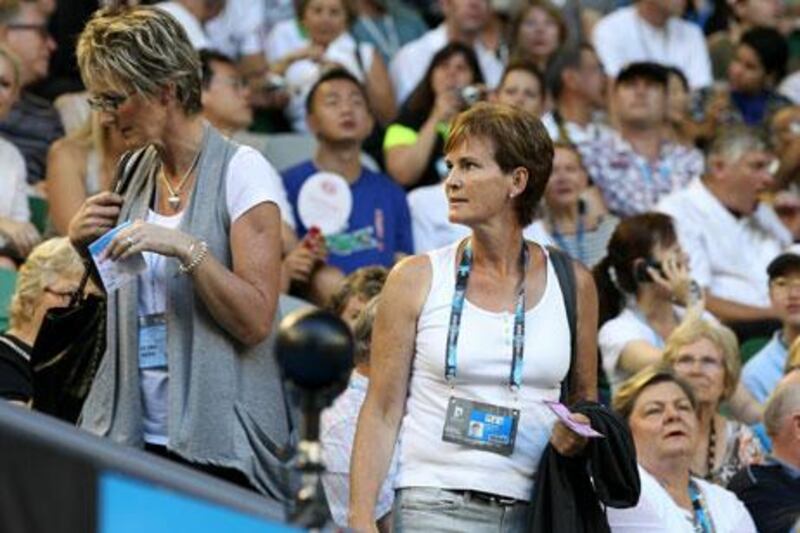Excuse me while I change into something more comfortable, some fan clothing.
Let me pull on my Andy Murray T-shirt, if such a thing exists, and let me scoop up my twin Andy Murray pompoms, one in Scotland blue-and-white and one with the additional red of the Union Jack, pardon any hurt feelings.
As a sportswriter trained not to care who wins sporting events and too steeped in the complexity of the athletes to watch anything with the folly that it is ever good-versus-evil, I want Murray to win a grand slam tournament.
I want this for several reasons, not least because a full-on theme has developed now that Murray has lost three slam finals while, tellingly or not, going 0-9 in the sets of those finals.
So just to begin, how many more times must we witness this scene, Murray not living up to himself in yet another anticlimactic final and then analysing the gloom in that hilariously mopey voice turned slightly mopier in the aftermath? Having just watched some video and read Murray's transcript from Australia, I wanted either to sob or take a nap.
For the mood of the tennis-curious chunk of the populace plus any general public that might happen upon clips on the BBC, such melancholia cannot go on indefinitely.
Then comes the discomfort of the gathering theme, which will dog all future Murray finals until he wins one. It can be grim watching an athlete fight a theme in press conferences. Clearly something is amiss with Murray and finals given his otherwise sparkling performances opposite the two men who have foiled him.
He had beaten Novak Djokovic thrice in a row in big, second-rung tournaments (Canada, Cincinnati, Miami) even if they had not played since spring 2009, and he stands a superhuman 8-6 against Ro-Ro-Ro-Roger Federer, the artful bulldozer.
Then comes that dreadful sentence: "No British man has won a grand slam tournament since 1936" - Fred Perry, US Open - a sentence as exhausted as its siblings, "No Englishman has won Wimbledon since Fred Perry in 1936," and, "No British man has won Wimbledon since Fred Perry in 1936."
While the keyboards of some chroniclers ought to come equipped with single keys that spew those sentences just to save energy, they are beyond stale. If you utter them out loud and squint carefully on the grounds of the All England Club, you can detect unmistakably that even Fred Perry's statue winces.
Mostly, though, I want to see Murray win a slam title for one, overarching reason. I would like to see it in the face of the former short-time professional Judy Murray, his mother so omnipresent at his matches, the first architect of his game, a being full of vivid, unapologetic humanity, and one of my all-time favourite subjects.
If ever seeing that face at that moment, I would think of how Judy played the tour herself in the threadbare early 1980s. How in France she slept in a tent that collapsed in a downpour. How she took buses to tournaments. How she went to post offices to collect vital money wired from her parents.
How she once lost in a first round to Mariana Simionescu, then kindly waited with Simionescu in the locker room while the latter had a furtive cigarette so as to hide the smoking from her disapproving boyfriend, Bjorn Borg.
I would remember that somebody swiped Judy's handbag in Barcelona, tipping her toward a concessionary return to Scotland, and how after that she took typing, took shorthand, worked as a secretary in a glass factory and an insurance office, as a management trainee in a department store, as a saleswoman for a confectionery firm.
I would remember that as she felt her own game lacked assertiveness, she tried to imbue her two sons' games with cunning and craftsmanship and weaponry. And I would laugh again at how she said she prefers sitting alone during her sons' matches, the better to avoid people who "chat inanely to me about what they think is going on."
Never having given birth myself, I would think about her excruciating description in Andy Murray's book. How she felt "the frustration of an active person suddenly surrounded by mashed vegetables". How she said later that first son Jamie - a 2007 Wimbledon mixed-doubles champion - had been "a very big baby with a very big head". How she rued the pain and thought, "Oh, I'll never do that again," except that 15 months later, she did.
Yeah, all told, that face would be some sight. Go, Andy, go.





